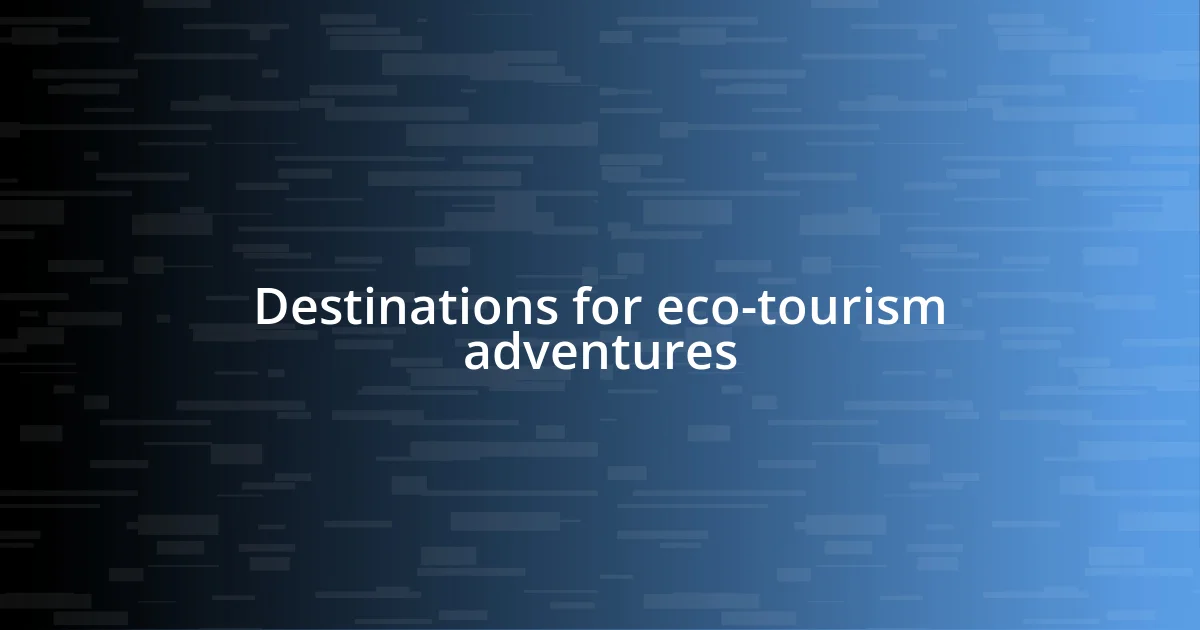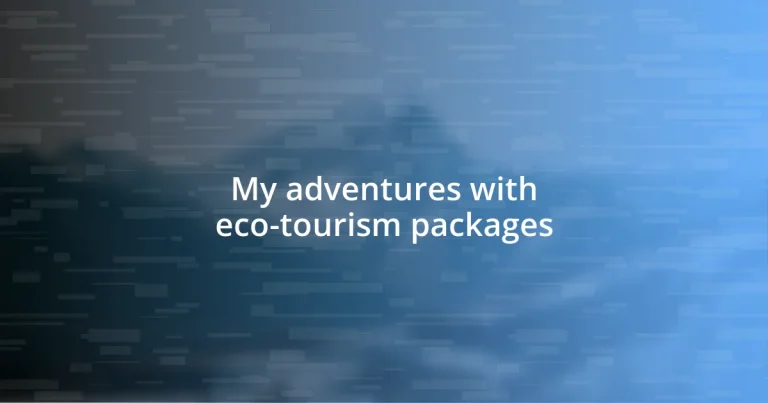Key takeaways:
- Eco-tourism emphasizes sustainable travel, education, and cultural exchange, fostering a deep connection with the environment and local communities.
- Engaging in eco-tourism activities, such as wildlife conservation and cultural immersion, enhances the travel experience while contributing positively to the ecosystem and local economies.
- Supporting local communities through responsible purchasing, volunteering, and dining helps preserve traditions and promotes sustainable practices in travel.

What is eco-tourism
Eco-tourism is a form of sustainable travel that focuses on exploring natural areas while minimizing environmental impact. It’s not just about visiting beautiful places; it’s about fostering a deeper connection with the environment. Have you ever felt that surge of joy when witnessing a stunning sunset while hiking through unspoiled nature? That’s the essence of eco-tourism—it’s about appreciating our planet’s beauty while learning ways to protect it.
What stands out to me about eco-tourism is its emphasis on education and conservation. It’s incredible to participate in tours where guides share local culture and conservation efforts. I remember joining a group that planted trees in a deforested area. The sense of purpose, coupled with the beauty of working in nature, was truly rewarding. How often do we get a chance to directly contribute to preserving the environment while enjoying it?
Additionally, eco-tourism encourages travelers to support local economies by engaging with communities. I once stayed at a rustic lodge run by indigenous people. Their stories and traditions gave me insights I could never have learned from a guidebook. Isn’t it fascinating how travel can transform not just our perspective but also contribute to the sustainability of local cultures? Eco-tourism isn’t merely a trend; it’s a way to travel with intention.

Benefits of eco-tourism
Eco-tourism offers numerous benefits, not just to the environment but also to travelers and local communities. For instance, engaging in eco-tourism often means supporting conservation efforts, which is something I personally cherish. When visiting a marine reserve, I remember the awe I felt while snorkeling alongside vibrant coral reefs, knowing that my visit contributed to their protection. Isn’t it wonderful how our enjoyment can coincide with making a positive impact?
Moreover, eco-tourism fosters cultural exchange, enriching the travel experience. Last year, I participated in a cooking class with a local family in a remote village. Their warmth and hospitality made the food taste infinitely better, but what struck me was how sharing this meal created a genuine bond between us. Traveling this way amplifies our understanding of different cultures, transforming us into more mindful global citizens.
Finally, eco-tourism promotes mental and physical well-being. Being surrounded by nature can be profoundly therapeutic. After a long trek through lush forests, I discovered a new level of tranquility I hadn’t felt in the bustling city. That connection to nature was rejuvenating—have you felt that serene calmness after a hike? The benefits of eco-tourism are multifaceted, enhancing not just our adventures but also our lives.
| Benefit | Description |
|---|---|
| Environmental Conservation | Promotes initiatives that protect wildlife and natural habitats. |
| Cultural Exchange | Encourages deep connections with local communities and traditions. |
| Mental Health | Enhances well-being through immersion in nature and physical activity. |

Choosing the right eco-tourism package
Choosing the right eco-tourism package can be a journey in itself. It’s essential to align your values with the offerings of the package. During my last trip, I was excited to join a tour that included wildlife observation, only to discover later that the practices were not as ethical as I’d hoped. It really opened my eyes to the importance of doing thorough research beforehand.
To ensure you pick an eco-tourism package that resonates with your values, consider these aspects:
- Conservation Practices: Look for packages that clearly define their conservation efforts and impact.
- Community Engagement: Choose tours that actively involve local communities, allowing for cultural exchange and support.
- Wildlife Considerations: Select tours focused on ethical wildlife experiences where animals are treated with respect.
- Carbon Footprint: Assess how the package addresses its carbon footprint, aiming for options that prioritize sustainability.
In my experience, asking the operators questions directly about these topics helped me feel more confident in my choices. Making an informed decision not only enhances our travel experiences but also contributes positively to the environments and communities we visit.

Destinations for eco-tourism adventures
When it comes to choosing destinations for eco-tourism adventures, places like Costa Rica truly stand out. I was fortunate enough to explore its lush rainforests, where every hike felt like entering a vibrant, living canvas of greens and browns. My senses were alive as I spotted toucans and sloths, making me wonder if there’s any other place quite as rich in biodiversity.
Another remarkable destination is New Zealand, where the commitment to sustainability is palpable. I remember kayaking in the serene waters of the Abel Tasman National Park, surrounded by breathtaking landscapes. It sparked a realization in me about how crucial responsible travel is; every paddle stroke felt significant, as if I was directly contributing to the preservation of its stunning natural beauty. Isn’t it inspiring when travel can mean so much more than just sightseeing?
Lastly, the Galápagos Islands offer an unparalleled eco-adventure experience. While snorkeling with sea turtles and playful sea lions, I was filled with gratitude for the careful protections in place to preserve this unique ecosystem. These moments made me reflect on how each visit can serve as a powerful reminder of our responsibility to protect such treasures. Have you ever felt that sense of urgency to appreciate and safeguard the wonders of our world?

Activities included in eco-tourism packages
Understanding the activities included in eco-tourism packages can truly enhance your travel experience. On my last eco-adventure, I enjoyed guided nature walks led by knowledgeable local experts. These walks transformed mere sightseeing into a rich educational experience, where I not only spotted exotic wildlife but also learned about the delicate ecosystems that sustain them. Have you ever had a moment that shifted your perspective like that?
In addition to nature walks, many eco-tourism packages feature hands-on conservation projects. During one of my trips, I participated in a beach clean-up initiative that not only made a tangible difference but also connected me with fellow travelers who were equally passionate about protecting the environment. It felt incredible to contribute to something bigger than myself, reinforcing the idea that every little action counts. Wouldn’t you agree that actively engaging in conservation makes travel so much more meaningful?
Another remarkable activity often included is cultural immersion. I’ve enjoyed unforgettable experiences like participating in traditional cooking classes with local families. These moments allowed me to bond over shared meals while delving into the stories and customs of the community. I now cherish these connections and the lessons learned about sustainability from those who live it daily. Isn’t it fascinating how travel can break down barriers and create lifelong relationships?

Tips for sustainable travel
To travel sustainably, I’ve found that choosing eco-friendly accommodations is key. On one of my trips, I stayed at a lodge that utilized solar energy and localized food sources, which heightened my awareness of my carbon footprint. Have you ever considered how your lodging impacts the environment? It’s a simple yet effective way to make sure your stay is as green as your surroundings.
I also focus on minimizing waste while traveling. I remember packing reusable water bottles and cloth bags, which not only reduced my plastic usage but also sparked conversations with fellow travelers who were curious about my choices. Wouldn’t it be great if we all adopted small habits like these? It’s the little things that can create momentum for larger changes in our travel culture.
When it comes to transportation, opting for public transit or biking can enhance the travel experience and reduce emissions. I can still recall cruising through a small town on a rented bicycle, feeling more connected to the place as I pedaled past local markets. I discovered charming spots that I would have missed otherwise, proving that sustainable travel can lead to some of the most authentic adventures. Isn’t it thrilling to explore in a way that’s both enjoyable and environmentally friendly?

How to support local communities
Supporting local communities is one of the most rewarding aspects of eco-tourism. I remember visiting a small village where my guide was a local artisan. He shared how his crafts were not just products; they represented a way of life and helped sustain his family. How often do we think about the stories behind the souvenirs we bring home? Purchasing directly from local artisans means our money helps preserve their traditions and improves their livelihoods.
Engaging in community-led projects can also make a significant impact. On another adventure, I volunteered with a local organization focused on reforestation. The warmth and hospitality of the community made me feel right at home. It was touching to witness their pride in restoring the land, knowing my small contribution was part of a larger effort. Have you ever been part of something that truly felt meaningful? These experiences create bonds that extend beyond travel, reminding us that we are all connected.
Dining at local restaurants is another great way to support communities. I vividly recall enjoying a meal prepared with ingredients sourced from nearby farms. Not only was the food incredibly fresh, but the chefs shared fascinating insights about their cooking traditions. It’s remarkable how food can serve as a bridge between cultures, isn’t it? By choosing to eat locally, we not only savor authentic flavors but also invest in the community’s economy, ensuring that the culinary heritage thrives.














